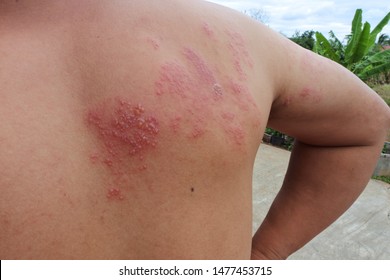Shingles is a transmissible disease caused by Varicella zoster virus; it is the same virus that causes chickenpox.
For anyone to have shingles, you must have had Chickenpox in the past as long ago as few decades.
Anyone with shingle cannot transmit shingles to someone else but can transmit Chickenpox to another person who hasn’t had chickenpox in time past.
After one might have had chickenpox, the virus- Varicella zoster that causes chickenpox moves into the nerve tissue close to the spinal cord and brain. After many years, for unknown reason, this virus gets reactivated and cause shingles also called herpes zoster.
The reason for shingles is unclear. But it may be due to lowered immunity to infections as you grow older. Shingles is more common in older adults and in people who have weakened immune systems.
Varicella-zoster is part of a group of viruses called herpes viruses, which includes the viruses that cause cold sores and genital herpes. Because of this, shingles is also known as herpes zoster. But the virus that causes chickenpox and shingles is not the same virus responsible for cold sores or genital herpes, a sexually transmitted infection.
WHAT ARE THE SIGNS AND SYMPTOMS OF SHINGLES?
The first symptom of shingles is usually pain with burning sensation on the skin. The pain is usually on one side of the body and occurs in small patches followed by the rash which is filled with blister, wrapped from the spine to the torso and itchy.

Other symptoms experienced by people are:
- Fever
- Chills
- Headache
- Fatigue
- Muscle weakness
WHERE CAN SHINGLES BE SEEN IN THE BODY?
It usually occurs only in one side of the body. Common site for shingles infection are: chest, abdomen, back and waist. Other uncommon site is face (usually appear on one side around the eye and forehead); it is also called herpes zoster ophthalmicus or ocular shingles. It can cause temporary or permanent blindness), ear (when shingles affect the ear, it can lead to problems with balance and hearing. This is also called herpes zoster oticus) or mouth (If it affects the mouth, a person might experience facial tenderness, pain in the mouth, toothache and lesions in hard and soft palate tissues).
TREATMENT FOR SHINGLES
The aim of treatment for shingles is to reduce pain and effects of the virus. The antiviral drug should be commenced within 72hours of the first appearance of the rash except in immunocompromised patients where it can be started after 72hours.
Examples of antiviral drugs used are acyclovir, famiclovir and valacyclovir.
Corticosteroid is used only in complicated shingles such as those with eye or ear involvement and should be used with concurrent antiviral therapy.
Over the counter antihistamine medication may help alleviate the localized itching.
In pain management, acetaminophen or NSAID may be used but more severe pain may require opioid.
Kindly note that it might take up to 4 weeks before the rash is completely gone. Therefore, cooperate with your doctor.
PREVENTION OF SHINGLES
Shingles cannot be transmitted but the varicella-zoster virus that causes it can spread to another person who hasn’t had chickenpox to develop chickenpox.
The Varicella-zoster virus is transmitted when someone comes in contact with an oozing blister but not when it is covered or already formed scabs.
To prevent the spread of varicella-zoster virus, the following must be ensured:
- If you have Shingles, keep the rash clean and covered.
- Do not touch the blister or allow others to touch it.
- Wash your hands often
- When you have shingles, avoid being around pregnant women and people with weak immune system like in case of HIV, Cancer, long term use of steroid and stress.
- Most importantly, get vaccinated!!!
FURTHER READING
https://www.mayoclinic.org/diseases-conditions/shingles
https://www.healthline.com/health/shingles#how-contagious
https://www.webmd.com/skin-problems-and-treatments/shingles/shingles-skin
https://www.medicalnewstoday.com/articles/154912
https://www.medicinenet.com/shingles_herpes_zoster/article.htm
https://www.nhs.uk/conditions/shingles/

Dr. Adeyemo Olusola is a medical graduate of Olabisi Onabanjo University, Ogun State, Nigeria along with certificate in advanced diploma in Principles of Nutrition, Management and Leadership, Dublin and Certificate in Global Health from London School of Hygiene and Tropical Medicine. In addition to his numerous certifications, he is a certified Telemedicine Physician from Harvard Medical School, USA. He is an avid reader of books from different oases of life, expert in data analysis. “So many a time, I have seen people die avoidable death because of lack of knowledge or information, falling victim of fate. There is then a necessity laid on us to help arm our society to the teeth, as a healthy society cannot be detached from an informed one. Hence, there is need for healthgist.net. We hope you will have a wonderful stay on our website.”

